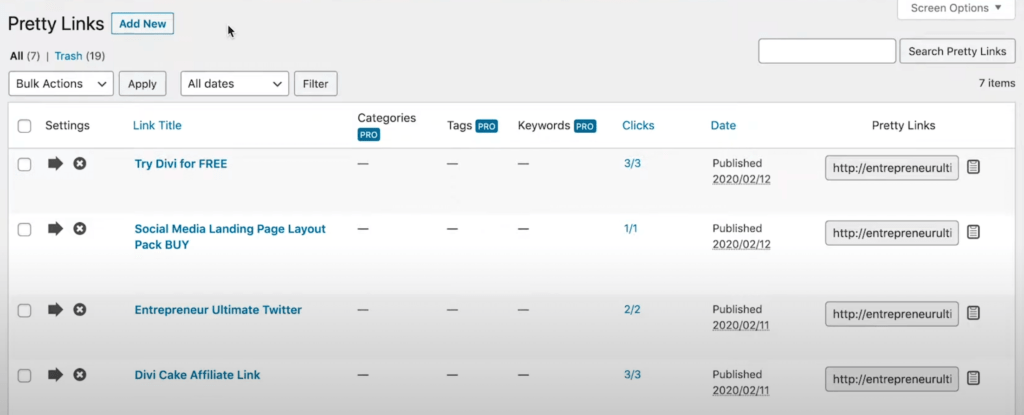3 Link Cloaking Benefits for Your Affiliate Marketing Business

Contents
There's a lot of misinformation around the concept of “link cloaking”. If you dabble in affiliate marketing, you might have heard about link cloaking and why you shouldn't do it. However, there's nothing inherently wrong with it. In fact, it can be a highly beneficial practice if you're serious about your affiliate business.
Link cloaking can help protect yourself against other people hijacking your referrals. The practice also makes it easier to manage affiliate links and track their usage. If you have a website with dozens of affiliate links, that last benefit can be a gamechanger.
In this article, we'll break down the benefits of link cloaking and why you shouldn't be afraid to do it. Before that, let's take a moment to go over how link cloaking works. Let's get started!
What is Link Cloaking?
Although the term “cloaking” can feel a bit mischievous, cloaking links is standard practice for many affiliate marketers. If you link to a company's product, you'll probably deal with URLs such as this:
companyname.com/product-name/B07NV48TJD/?_encoding=UTF8
Big ecommerce sites usually aren't in the habit of using “pretty” links. Instead, they rely on complex URL structures due to the abundance of products they offer.
As an affiliate marketer, that can pose a problem to you. Some users may be less likely to click on links if they can't see where you're sending them. The practice of link cloaking involves taking an external affiliate URL and transforming it into something shorter and less intimidating. For example, that lengthy-looking link might become something like this:
yourwebsite.com/product-x
Usually, when people tell you not to use link cloaking, they cite concerns about search engine optimization (SEO). From a technical standpoint, there's nothing wrong with implementing redirects, which is the process at the core of link cloaking. Using a link that sends users to a second URL is generally fine as long as you safely set it up.
If you're not sure how to tackle link cloaking, using a plugin such as Pretty Links can make your work a lot easier:

In fact, link managers and cloaking tools could be a necessity if you promote a broad range of affiliate products on your website.
3 Link Cloaking Benefits for Affiliate Marketing
Implementing link cloaking in WordPress is relatively simple if you're using the right tools. However, before you start replacing affiliate links on your website, let's go over the benefits of link cloaking, one by one.
1. You Can Shorten Affiliate Links
As a rule of thumb, affiliate links tend to be long and unwieldy. The worst part is, in most cases, the links themselves don't give you any information about the page that you're going to visit. Savvy visitors will hover their mouse over the linked text, see URLs they can't decipher, and decide to skip over them.
Link cloaking can enable you to take those links and transform them into URLs that are short and give your users an idea of what they're in for:

When visitors hover over your links, they'll see URLs from your domain that are easy to parse (if you do things right!)
2. It Enables Easier Affiliate Link Management and Tracking
Depending on what link cloaking tool you use, you'll generally get access to a dashboard that enables you to manage all of your affiliate URLs. For example, here's how the Pretty Links link management screen looks in WordPress:

Using this tool, you'll be able to see all of your affiliate links at a glance. Moreover, you'll get access to important information, such as how many clicks you're getting. This data is invaluable when determining which of your links are getting attention and which aren't.
If you see links that aren't getting decent numbers of clicks, even on articles or pages that are relatively popular, then it might be time to consider trying a different approach. For example, you might try hyperlinking different words, placing links in other positions, or reworking the content.
3. It Can Increase the Effectiveness of Email Affiliate Marketing
If you use email marketing to promote affiliate links, you might run into a problem. In some cases, product links can trigger spam filters and your messages won't make it into your users' inboxes. Moreover, if they get flagged as spam too often, your email marketing provider might decide to terminate your account.
Generally speaking, that shouldn't be an issue if you're not spamming users with affiliate links via email. However, you can sidestep that issue entirely by using link cloaking. Moreover, with link cloaking tools, you'll also be able to track how effective your emails are.
Some link cloaking tools, such as Pretty Links, provide you with in-depth reports that track more than just placements on your site:

For example, you can see how many subscribers are clicking on your email affiliate links. If you combine that information with your email marketing service's analytics, you'll get access to a lot of data about which content is working out and which isn't.
Conclusion
If you're serious about affiliate marketing, link cloaking could be an invaluable tool. It's not just about creating shorter or prettier links either – there are tangible benefits to link cloaking that you'll miss out on if you use the default URLs that affiliate networks or programs provide you with.
To sum it up, here are the top benefits of link cloaking that you can enjoy if you use a plugin such as Pretty Links:
- You can shorten affiliate links.
- You can benefit from affiliate link management and tracking.
- You can use the data to improve your email affiliate marketing.
Do you have any questions about whether you should use link cloaking or not? Let's talk about them in the comments section!
If you liked this article, be sure to follow us on Facebook, Twitter, and LinkedIn! And don't forget to subscribe to our newsletter.